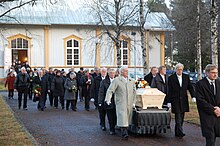
Back مشكلة الاستقراء Arabic Problema de la inducció Catalan Problém indukce Czech Induktionsproblemet Danish Induktionsproblem German Problema de la inducción Spanish Induktsiooniprobleem Estonian Indukzioaren arazoa Basque مسئله استقراء Persian Induktion ongelma Finnish


| Part of a series on |
| Epistemology |
|---|
First formulated by David Hume, the problem of induction questions our reasons for believing that the future will resemble the past, or more broadly it questions predictions about unobserved things based on previous observations. This inference from the observed to the unobserved is known as "inductive inferences". Hume, while acknowledging that everyone does and must make such inferences, argued that there is no non-circular way to justify them, thereby undermining one of the Enlightenment pillars of rationality.[1]
The traditional inductivist view is that all claimed empirical laws, either in everyday life or through the scientific method, can be justified through some form of reasoning. The problem is that many philosophers tried to find such a justification but their proposals were not accepted by others. Identifying the inductivist view as the scientific view, C. D. Broad once said that induction is "the glory of science and the scandal of philosophy".[2] In contrast, Karl Popper's critical rationalism claimed that inductive justifications are never used in science and proposed instead that science is based on the procedure of conjecturing hypotheses, deductively calculating consequences, and then empirically attempting to falsify them.
- ^ Hume, David (January 2006). An Enquiry Concerning Human Understanding – via Gutenberg Press.#9662: Most recently updated in 16 October 2007
- ^ Gustavsson 2021, Note 16 in Sec. 7.
© MMXXIII Rich X Search. We shall prevail. All rights reserved. Rich X Search